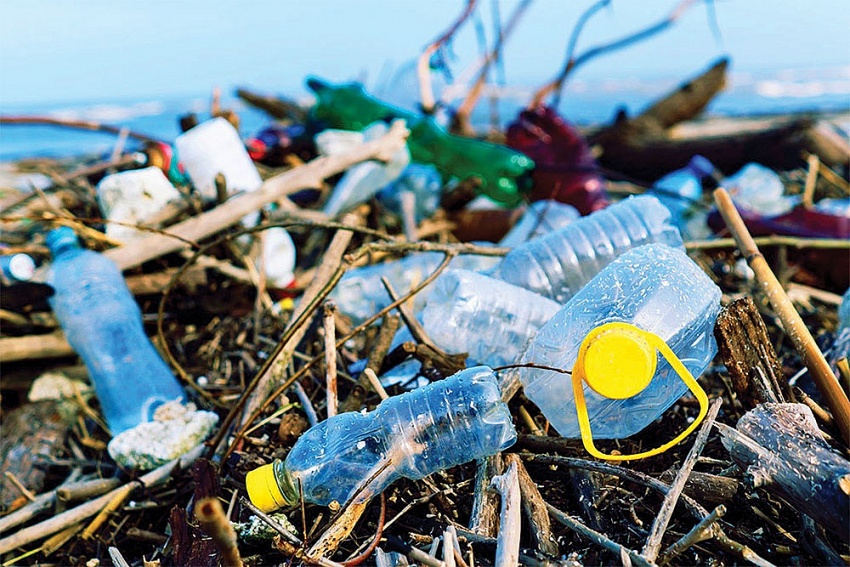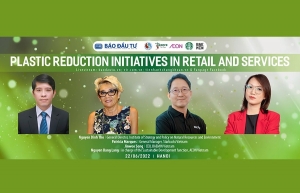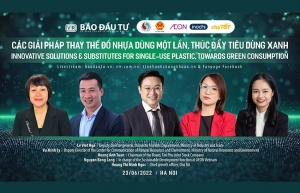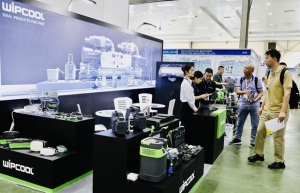Global treaty in sight for plastics battle
Truong Duc Tri, deputy director general of the Ministry of Natural Resource and Environment’s Vietnam Agency of Seas and Islands, said that Vietnam is working with stakeholders and the international community to successfully build and enact a global treaty on plastic pollution, which will be discussed at COP28, set to be held later this year in Dubai.
“As a very active and responsible member of the Partnerships in Environmental Management for the Seas of East Asia (PEMSEA), at the regional level, Vietnam strongly supports participating in negotiations to build this plastic pollution treaty,” Tri said at last week’s workshop in Hanoi on regional cooperation towards the Global Treaty on Plastic Pollution.
“By making this agreement, Vietnam and other countries will show a spirit of solidarity to work with the international community to solve the problems of plastic pollution,” Tri stressed.
 |
| Global treaty in sight for plastics battle, Photo: Le Toan |
The workshop was attended by representatives from eleven countries belonging to the PEMSEA and other non-member countries. PEMSEA is an intergovernmental organisation operating in East Asia to foster and sustain healthy and resilient oceans, coasts, communities and economies across the region.
Ramla Khalidi, resident representative of the United Nations Development Programme (UNDP) in Vietnam, stated, “Plastic is destroying our marine ecosystems and polluting our oceans at an unprecedented rate. Plastic does not recognise borders, travelling across seas, rivers, and deltas to affect all societies and economies. Without action, we risk having more plastic than fish in the oceans by 2050.”
According to the Organisation for Economic Co-operation and Development, the plastic waste is expected to double from 22 million tonnes in 2019 to 44 million tonnes by 2060. This suggests that actions are needed, both at global, regional, national and local level.
Under the World Bank’s recently released report on a national single-use plastics roadmap in Vietnam, globally, plastic litter is a widespread problem. Of the more than eight million metric tonnes of plastic waste dumped in the world’s oceans, annually, an estimated 90 per cent comes from just 10 rivers, eight of which are in Asia. In Vietnam, the estimated annual discharge of plastic waste into the ocean is 280,000-730,000 tonnes.
Also in Vietnam, 2.8-3.1 million tonnes of plastic waste are discharged on land every year, which makes the country one of the world’s major sources of plastic litter. According to the Vietnam National Plastics Action Partnership, the amount of plastic in waterways could more than double by 2030 if the country’s current waste collection, recycling, and treatment processes are not improved.
Another World Bank study named “Vietnam: Plastic Pollution Diagnostics” released last year also showed that plastic waste is by far the most abundant type of waste collected in river and coastal sites, accounting for 94 per cent of the number of items and 71 per cent by weight. The top 10 most common plastic items account for more than 80 per cent of the total plastic waste ending up in waterways. The majority of plastics polluting Vietnam’s waterways are single-use, low-value items such as plastic bags, food containers, and straws.
Carolyn Turk, World Bank country director for Vietnam, said, “Rapid economic growth, urbanisation, and changing lifestyles in Vietnam have led to a countrywide plastic pollution crisis. This study indicates that single-use plastic items constitute a large portion of plastic pollution in Vietnam, and addressing their use will make a big difference.”
According to Khalidi of the UNDP, there are two critical aspects in the fight against plastic pollution.
“Firstly, recognising, supporting, and ultimately enhancing the contributions of informal waste workers to the waste management system, and considering how the global treaty may be able to build on these contributions. The informal sector in Southeast Asian member states plays an important role in waste management. The women and men who lead this sector are often the unsung heroes in the fight against plastic pollution,” Khalidi said.
“Secondly, realising the ambitious goals of the Global Treaty on Plastic Pollution will require adequate financing, especially through innovative financing mechanisms, in order to ensure efforts are fully supported for transformative change on the ground.”
To address the pollution caused by these items, Vietnam needs a progressive phase-out, accompanied by the promotion of viable alternatives, and an improved solid waste management system. “Vietnam’s government is aware of the environmental threat posed by plastic litter, and the urgent need to take action to reduce plastic pollution,” the World Bank stated.
 | Talk show to discuss solutions on reducing plastics in retail and services The talk show on Plastic Reduction Initiatives in Retail & Services will take place from 3 to 4.30pm on June 22, with the participation of experts from the Institute of Strategy and Policy on Natural Resources and Environment and representatives of leading enterprises in Vietnam. |
 | Talkshow Innovative Solutions & Substitutes for Single-use Plastic towards Green Consumption Green manufacturing and green consumption are the global trends of development in recent year, Vietnam also goes green with various commitments on Net Zero emission as well as actions to reduce plastic wastes nationwide. |
 | Plastics & Rubber Vietnam Exhibition 2023 opens in Hanoi Plastics & Rubber Vietnam 2023, an international plastics & rubber technologies and materials exhibition, kicked off at the International Centre for Exhibition in Hanoi on July 25. |
What the stars mean:
★ Poor ★ ★ Promising ★★★ Good ★★★★ Very good ★★★★★ Exceptional
Related Contents
Latest News
More News
- Trung Nam-Sideros River consortium wins bid for LNG venture (January 30, 2026 | 11:16)
- Vietnam moves towards market-based fuel management with E10 rollout (January 30, 2026 | 11:10)
- Envision Energy, REE Group partner on 128MW wind projects (January 30, 2026 | 10:58)
- Vingroup consults on carbon credits for electric vehicle charging network (January 28, 2026 | 11:04)
- Bac Ai Pumped Storage Hydropower Plant to enter peak construction phase (January 27, 2026 | 08:00)
- ASEAN could scale up sustainable aviation fuel by 2050 (January 24, 2026 | 10:19)
- 64,000 hectares of sea allocated for offshore wind surveys (January 22, 2026 | 20:23)
- EVN secures financing for Quang Trach II LNG power plant (January 17, 2026 | 15:55)
- PC1 teams up with DENZAI on regional wind projects (January 16, 2026 | 21:18)
- Innovation and ESG practices drive green transition in the digital era (January 16, 2026 | 16:51)

 Tag:
Tag:




















 Mobile Version
Mobile Version